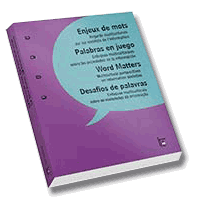Words Matters : Story of a Project
In politics, as in other areas, words are never neutral. They can be interpreted and sometimes misinterpreted, they convey the history of the society from which they emanate, they create representations of the world for their users. These representations are diverse, contradictory, and sometimes incompatible, depending on who uses them, on the interests and social situations that they reflect.
Yet often words are used to remove contradictions, in a supposedly consensual and apolitical way. In fact, everyone has their own definition hoping, consciously or unconsciously, that over time their “representation of the world” will win out, that the words they use will be used by everyone else. In the end, the power of dominant groups is reinforced and the conservative status quo on the real issues remains firmly in place.
In a context of fast-moving globalization, words matter more and more, as expressions of ideology, as opportunities for political confrontation from which citizens are excluded. Take, for example, expressions such as “governance” and “development”, amongst so many others. Now absorbed into the current vocabulary of numerous national and international institutions, the ideological assumptions that they incarnate have often been forgotten and, in our imagination and our collective vocabulary, they have become “neutral”. It is this neutralising process that many other players are now simultaneously denouncing (Southern countries, social and civil movements...).
Since the mid 1990s, these movements have knuckled down to the task of developing an alternative vision, a citizen’s response, for the most complex and/or obscure themes in our societies, from international finance to biotechnologies and public health. Definitions of words and concepts used in documents relating to international negotiations or national action plans have taken on a highly political dimension. It now seems therefore essential that an attempt be made to create a community debate which can influence this situation by developing a different perspective. The ability to name offers citizens an opportunity to participate directly in the political process.
Words cannot be considered outside the linguistic and cultural contexts in which they exist. If it is misleading to believe that literal translations are adequate for reading fundamental texts (usually originally written in English), it is important to distinguish the subtle differences in meaning between the various languages (and accept that sometimes equivalents do not exist, as for example when two French words “connaissance” and “savoir” can only be translated by one word in English: “knowledge”). For languages such as French and Spanish, which are spoken in a number of geographical areas, it is useful to be aware that meanings can vary from area to area, in Northern and Southern countries for example: dœs “community network” have the same meaning in Paris as in Timbuktu?
The new Information Age in which we live has to face up to these questions: with construction already underway, players investing in its deployment are in the process of establishing the vocabulary and thus defining the limits to be placed around the space of collective representations.
Thus, the first phase of the WSIS (World Summit on the Information Society) in Geneva has clearly demonstrated the potential that certain expressions have for creating controversy, but has not provided an opportunity for decoding and debating the most provocative terms, such as “information society”. In the specific context of information and communication technologies, where - thanks to the way they are used - most concepts have emerged from the grassroots level and risen to the top, a purely academic approach could also prove dangerous, since it may not take advantage of the participative essence. This essence constitutes a unique culture in a domain which extols the emergence of a new paradigm and which is identified, characterized, by the quantity of neologisms it uses.
Given this situation and in the lead-up to the second phase of WSIS, the Carrefour Mondial de l’Internet Citoyen (Montreal), together with two other associations Vecam in Paris and Funredes in Santo Domingo, decided to launch an analysis which would be both contradictory and inter-cultural. This project is part of an on-going three-way partnership of many years standing, in the context of GCNP (Global Community Networks Partnership), a partnership which has confirmed the closeness of their mutual commitment.
The project “Word Matters for an Information Society” came from this initiative: several authors, selected for their capacity to combine an academic approach with the familiarity of a user, were contacted and asked to discuss central concepts of the Information Society. In establishing the final list of 27 authors, it was imperative that the group represent diversity of cultural origin.
The instructions given to the authors included an editorial guide, which outlined the key aspects to be included: history of the concept and the range of possible definitions, together with a critical review of the formal definition generally used during international negotiations.
The three objectives of “Word Matters” were to:
![]() Bring into the public arena those controversies, the political significance of which are largely unknown or underestimated.
Bring into the public arena those controversies, the political significance of which are largely unknown or underestimated.
![]() Help social and civil movements to understand the terms of the debate and to establish a vocabulary which reflects their practices as well as their own political positions and, not those of international institutions.
Help social and civil movements to understand the terms of the debate and to establish a vocabulary which reflects their practices as well as their own political positions and, not those of international institutions.
![]() Contribute, at the same time, to reinforcing of these movements and their capacity to help build an alternative form of political action.
Contribute, at the same time, to reinforcing of these movements and their capacity to help build an alternative form of political action.
The project was carried out in 4 phases:
![]() the authors write their texts,
the authors write their texts,
![]() the texts are translated into three languages and distributed, via a dedicated website, and reviewed by the other authors, through a closed discussion list,
the texts are translated into three languages and distributed, via a dedicated website, and reviewed by the other authors, through a closed discussion list,
![]() the authors revise their texts taking into account comments made by other members of the group and the editorial committee,
the authors revise their texts taking into account comments made by other members of the group and the editorial committee,
![]() publication of a new final version in four languages.
publication of a new final version in four languages.
Unsurprisingly, repeatedly translation of contributions in four languages turned out to be a laborious, but indispensable, process.
The results of this work are contained in a single publication in four languages which will be presented at Tunis during the World Summit on the Information Society.
The promoters of the project do not intend to stop there, even if the “product” achieves its objective. They want to launch an on-going process of reflection and debate in a spirit of cooperative intelligence which will include the challenge of multilingualism. For this reason, they expect that the texts included in this book will be posted on multilingual collaborative portals and discussed in the various regions of the world. The host sites are lecarrefour.org, vecam.org, and funredes.org and we hope that mirror sites will take the texts up and broaden the scope of this collaborative effort.
This project is an initiative launched by Carrefour Mondial de l’Internet Citoyen, in partnership with Vecam and Funredes. The translations were coordinated by Union Latine. C&F Éditions were responsible for its publication and agreed to publish the documents under the Creative Commons licensing system (by, ncc). Under this system, anyone can copy or reproduce the articles, on condition that the name of the author and the source are included and that they are used exclusively for non-commercial purposes.
The project was funded by a grant from AIF (Agence Intergouvernementale de la Francophonie) and CRDI (Centre de Recherche pour le Développement). The French Ministry of Culture contributed to the cost of translation and the entire project was made possible by the many people who generously offered their time and efforts.
Carrefour Mondial de l’internet Citoyen
Based in Montreal, the “Carrefour mondial de l’Internet citoyen” is a Quebec agency committed to the promotion and defence of the right to communicate. It brings together members of community networks, organisms, institutions, and individuals involved in the use of information and communication technologies for community purposes while encouraging plurality and cultural diversity.
http://lecarrefour.org
Contact: Alain Ambrosi, ambrosia@web.ca
Vecam
“Vecam” is a French association based in Paris, which since 1995 has focused on three objectives: contribute, with a watching brief, to the reflection on the impact of information technologies on society; to encourage non-profit organizations to make use of ICTs in their projects, especially international cooperation projects; mobilize for the construction of an alternative political vision for the Information Society.
http://www.vecam.org
Contact: Frédéric Sultan, fsultan@vecam.org
and Valérie Peugeot, vpeugeot@vecam.org
Funredes
Funredes is a non-governmental organization based in the Dominican Republic and dedicated to the dissemination of new information and communication technologies (NICT) in developing countries, especially in Latin America and the Caribbean, in collaboration with International Organisations, NGOs, States, Administrations and public or private institutions, with the objective of contributing to regional development and integration.
http://funredes.org
Contact : Daniel Pimienta, pimienta@funredes.org







